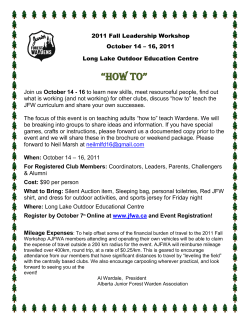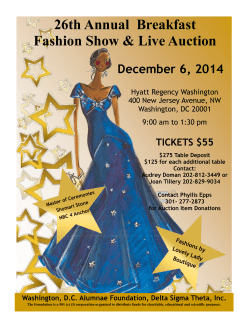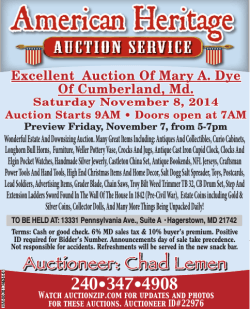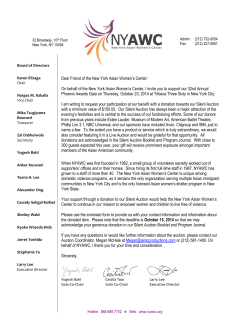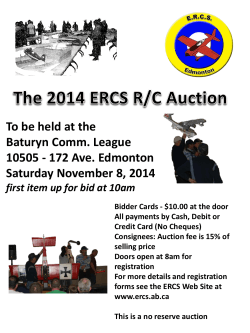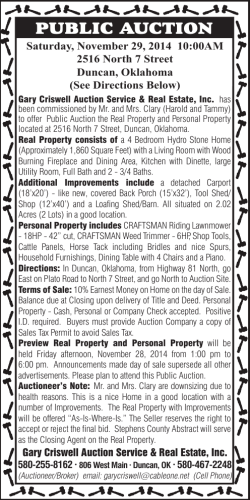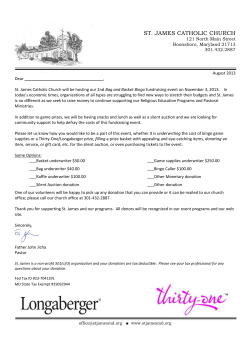
The Arsenal Newsletter Greater Pittsburgh Civil War Round Table
The Arsenal Newsletter Greater Pittsburgh Civil War Round Table November 2014 “The Civil War is the crux of our history. You cannot understand any part of our past, from the convening of the Constitutional Convention, down to this morning, without eventually arriving at the Civil War.” Bernard de Voto "AN ARMY REBORN" The Story of Robert E. Lee and the Army of Northern Virginia by our guest speaker Mr. Jeffry D. Wert Monday 7 P.M. November 17th, 2014 at The Hampton Community Center 3101 McCully Road Allison Park, PA 15101 ABOUT OUR SPEAKER Jeffrey D. Wert is the author of eight previous books on Civil War topics, most recently Cavalryman of the Lost Cause and The Sword of Lincoln. His articles and essays on the Civil War have appeared in many publications, including Civil War Times Illustrated, American History Illustrated, and Blue and Gray. A former history teacher at Penns Valley High School, he lives in Centre Hall, Pennsylvania, slightly more than one hour from the battlefield at Gettysburg. OCTOBER SPEAKER REVIEW By Stan Herman Fighting the Civil War- Mr. Wayne Motts You may have heard the saying, “If you find a job that you enjoy, you will never have to work a day in your life.” This axiom was exemplified by our October speaker, Wayne Motts, Executive Director of the National Civil War Museum. Mr. Motts’s enthusiastic presentation demonstrated his love of history and the Civil War era. He described events of the war from its beginning to its end while illustrating those events with artifacts from the museum’s 25- thousand piece collection. Mr. Motts began his lecture by recounting John Brown’s raid on the Harper’s Ferry arsenal in 1859. Brown’s goal was to seize the arsenal, arm slaves, and lead a revolt against the southern slaveholders. The revolt was quashed by Captain Robert E. Lee, and Brown was captured and tried for treason. Brown was found guilty and hanged on December 2, 1859. The pen that Virginia Governor Henry Wise used to sign Brown’s death warrant is part of the museum’s collection of artifacts. Mr. Motts ended his lecture by recounting the surrender of General Robert E. Lee at the Wilmer McLean House at Appomattox Court House, Virginia. Souvenir hunters carried away numerous objects from the McLean property. Among them were two small bats carved from branches of an apple tree on the property. The two bats, owned by Union General Joshua Chamberlain, are now the property of the National Civil War Museum. Among the other artifacts owned by the museum are: A letter written by Colonel Thomas Meagher commander of the famous Irish Brigade to Chester A. Arthur, New York Quartermaster, requesting supplies for his troops. An 1861 flag of the 8th Virginia Volunteers used in rallying and recruiting volunteers. A belt buckle, cartridge pouch, and set of spurs made at the Allegheny Arsenal in Pittsburgh. A hat band worn by one of the men who sailed and fought on the U.S.S. Monitor, one of only 52 such bands known to exist. A sash won by Confederate Colonel Robert Pitman at the Shiloh Campaign. 2 A letter written by Benair C. Sawyer, the 24th mayor of Pittsburgh, to the Pennsylvania legislature requesting a commission. One of the saddles invented and used by General George McClellan. A bloodied bible, with a bullet lodged in the pages, carried by Confederate Sgt. Adam Troutman when he was wounded at Antietam. A Colt revolver awarded Pittsburgh born General Benjamin Grierson, commemorating a cavalry raid that severed communications between besieged Vicksburg and the Confederacy. Robert E. Lee’s personal bible given to a confederate soldier later captured during the Siege of Petersburg. HONORING AND CELEBRATING OUR VETERANS By Allison Caveglia Barash We are pleased to shine the veteran’s spotlight this month on long-time round table member and regular attendee, George M. Benko. George served in the US Army from 1970-1973 attaining the rank of Specialist 4th Class. He was stationed in Germany. Among his most vivid memories are visiting the east/west border and qualifying with German weapons. We thank George for his honorable service to our country and are proud and honored that he is a member of our round table. PROBLEMS AND MORE PROBLEMS FOR THE CONFEDERACY By Jim Wudarczyk In grade school and high school, we were all probably taught that the South lost the war because the Union had more population, more factories, and virtually more of everything. While this is true, it is an over-simplification of some of the major problems facing the Confederate States of America. One of the major issues that divided states within the Confederacy was secession. Although the popular Hollywood version of this great historical event typically depicts Southerners ecstatic when they learn their respective state broke away from the Union, there were in parts of the South where sharp division over secession existed. The rift between pro-Union and pro-Confederacy loyalties resulted in the splitting of Virginia into two separate states in 1863. Lincoln was able to keep the border states in the Union by exempting those states from complying with draft laws. The Confederacy did not have that option. In other areas of the South, a virtual civil war existed within the Confederacy. In an interesting article by Carl N. Degler, forty-nine percent of the voting population supported candidates in the 1860 election who opposed secession. Degler argued that 40.3% of the vote went to John Bell of Tennessee, who was well-known as a slave-holding Whig and ardent opponent of secession. Another 8.6% of the 3 voters supported Stephen A. Douglas, the Democratic candidate who also voiced opposition to the formation of the Confederacy. Apparently opposition among white Southerners to secession was strongest in those areas where there was little slavery. Although there were a substantial percentage of persons voting for candidates with proven track records opposing slavery, the large percentage of votes for the Bell candidacy reflected a strong dislike of Lincoln and the Republican Party. During the course of the war, there were 102 U.S. regiments of white Southerners, or a total of 86,011 men serving in the Union army from several Southern states. What may have tipped Southern attitudes toward support of the Confederacy was the realization that Lincoln would use force rather than prolonged diplomacy to resolve the issues. A factor that may have dissuaded the Unionist in the South from being more vocal opponents to the concept of the Confederacy was the exerting of authoritarian force against dissenters. Just as Lincoln had suppressed Constitutional rights in the North, the South was equally guilty of suppressing civil liberties, which was a source of contention among many in the Confederacy. The C.S.A. spewed a tremendous amount of rhetoric about individual liberty and the sovereign right of the states. However, there was a major gap between what was said and what was practiced. The Confederate military made 2,672 civilian arrests during the course of the war. Angered by the fact that martial law had been declared in Eastern Tennessee, there was a movement in that portion of the state to break away from the Confederacy just as Western Virginia had done. Confederate Secretary of War Judah P. Benjamin imposed draconian tactics to stop civilians from engaging in any acts—including the burning of bridges—to impede the military. Anyone caught engaging in any activities against the military was subject to be hanged. Conscription was another source of contention. Many Southerners, while loyal to their states, were opposed to the fact that they had to fight for slaveholders, who had military exemption. To deter desertion, Judah Benjamin imposed a passport system on nearly all civilian movements within and between the Confederate states. Also, slaves, who cooperated with the Union troops when they were moving through an area, were subject to whippings and even execution by the Confederate military once they regained controlled of a region. At first the Confederacy was dependent upon volunteers to staff its army, but it quickly realized that the ranks of the military would be quickly depleted once the volunteers became disillusioned with the hardships of army life. On April 16, 1862, the C.S.A. passed the first of three conscription acts. This act extended the enlistment of all volunteers from twelve months to three years or the end of the war. It required all white males between the ages of 19 and 35 to serve under the same terms. By October 11, 1862, the second conscription act increased the age of men serving from 35 to 45. A third act in February 1864 further increased the age of service to include all white males between the ages of 17 and 50. The unpopularity of the draft was accelerated by the fact that there were exemption provisions for all state and Confederate employees, politicians, contractors, and tradesmen that were considered essential to the Southern economy, including tanners, overseers, blacksmiths, wagon makers, millwrights, and anyone employed in paper mills, wool and cotton factories. While it was possible to buy a military exemption for $300 at the beginning of the war, the price rose to several thousand dollars by the end of the war. On the home front, the war created economic hardships for the women and the families of men drafted into military service on both sides of the conflict. Widows and orphans were not the only ones 4 who faced destitution. As the war dragged on, the price of flour, salt, pork, and yarn dramatically increased. Since poor white men could not afford to buy their way out of military service, they were forced into military duty while their wives had to take care of the family farms or seek employment in the cities. Often times the women would appeal directly to the state governors seeking a release of their husbands from military service. The situation grew so desperate for food and basic necessities just to keep their families from starvation, the women began to steal and riot. Throughout the course of the war, there were a number of food riots: New Orleans (1861), Bartlow County, Georgia (1862), and various cities in Georgia, North Carolina, and Virginia (1863). Taxation proved to be another sore spot with Southerners. To finance the war, the Confederate Congress imposed a one-half of one percent tax on property valuations. Since most states did not want to further increase the tax burden on their citizens, the states borrowed the money and took on additional state debt. In addition, over the course of the war, the Congress placed a license tax of between $50 and $500 on many occupations and enacted an 8 percent income tax on all incomes over $500, and placed a tax of 10 percent on all agricultural products beyond an allowance for family subsistence. The latter tax was known as T.I.K. or tax-in-kind, which meant that the tax was levied on the gross value of the crops, not its profitability. Payment was made in the form of agricultural products. This tax-in-kind was probably the most controversial and dreaded of all taxes because it was fraught with corruption, and often the food stuffs were left to rot at depots before quartermasters could arrange for the transportation of the goods to the army that desperately needed the food. Toward the end of the war, the Confederacy had to modify the tax-in-kind program, but by that time it was too late since the war was being lost on all fronts. With so many internal problems, it is a wonder that the Confederacy held itself together for four years. SILENT AUCTION ITEMS NEEDED by Allison Caveglia Barash Those of you who have attended our December meetings in the past know that we have one of the largest and best silent auctions around! Past auctions have featured over 100 different items including period photographs, battlefield artifacts, Civil War art, patriotic and hand-made items, great books, videos and more. However, the Silent Auction is not possible without donations from our members! So start cleaning those closets and consider donating items you no longer need or want to the Silent Auction. While Civil War-related items are great, we will happily accept anything that is in good condition (with the exception of used clothing). All appliances must be clean and must work. It is important that our auction items are of good quality. You might also want to consider donating a service like driving someone to the airport or baking a cake. Silent Auction donations will be accepted by Allison Barash and Joann Siriano at the November meeting. If you have large or heavy items, such as furniture or appliances, please contact Allison about them first before bringing them to the meeting. Remember that the money that is generated by the Silent Auction goes right back into round table programming, enabling us to bring in dynamic speakers on a wide variety of Civil War topics. Direct all Silent Auction inquiries to Allison Barash at [email protected] or 412-366-3854. Thanks in advance for your generosity! 5 GET ‘EM BEFORE THEY’RE GONE! by Allison Caveglia Barash Our much anticipated Greater Pittsburgh Civil War Round Table calendars sold very well at the October meeting, so only a limited number will be available for purchase at the November meeting. These 2015 calendars feature photographs taken exclusively by our members. They were the twelve top vote-getters out of the more than forty photos submitted. These photos of Civil War sites, ranging from Gettysburg to Andersonville and many places in between, are all in full color. Each calendar costs $12. The profits will be directed toward battlefield preservation. Buy one for yourself and for your historically-minded friends and relatives. They make great holiday presents. You can feel good knowing that with each calendar you buy, you are helping to save endangered hallowed ground. If you would like a calendar mailed to you, contact Allison at the email address below or at 412366-3854, or send a check for $14 (includes $2 for postage) made out to “GPCWRT” to Allison Barash, 1610 King James Drive, Pittsburgh, PA 15237. Indicate that you are ordering a calendar and include your name and complete mailing address. If you have any questions, feel free to contact John ([email protected]) or Allison ([email protected]). RAFFLE DONATIONS Until further notice, no more items are being accepted. We are overstocked and need to get rid of some of the items we already have. Do not bring any more items at this time. Thank you to the following roundtable members for their donations last month. Allison Barash, George Benko, Ron Brown, John Haltigan, Stan Herman, Burt Kennedy, Jim Lisica, Rege Ricketts, Joe Schulmeister, Autumn Shuty, Mike Sparlin, Susan Thomas, Bern Weaver, John Weixel, Sterling Ziegler, and Al Zimmerman GPCWRT HOLIDAY DINNER AND SILENT AUCTION If you have not made plans to attend the annual holiday dinner and silent auction, there is still time. As in the past, you can BYOB if you like. You can also bring cookies to add to the dessert table. Plan to arrive around 5:30 pm to view the silent auction items. A registration form is attached at the end of the newsletter. Joann will also have forms available at the next meeting. You can still attend the regular meeting if you do not attend the dinner. The regular meeting should start around 7:00 pm. 6 2015 MEMBERSHIP DUES by Joe Schulmeister To honor those veterans that served during WWII and The Korean War, the roundtable officers have decided they will no longer pay dues. Please let Joann know if you are a WWII or Korean War Veteran. All other roundtable members are reminded that the dues for 2015 can be paid starting now. All dues should be paid no later than the end of March. A membership form is included with this issue. If anybody wants to change from a mailed newsletter to an email newsletter, now is the time. Even though we bought our own printer last year, we still have to pay for paper, toner, and postage. By switching to an emailed newsletter, you are helping the roundtable save money that can be used for other purposes. FUTURE EVENTS Saturday December 6th in the Ford Education Classroom at the Gettysburg National Military Park Museum and Visitors Center at 1195 Baltimore Pike, Gettysburg. One of our favorite speakers, Charlie Fennell, will present an all-day indoor program to discuss "Lee and Ewell at High Tide". Fennell will critically analyze the working relationship between Lee commanding the Army of Northern Virginia, and Richard Ewell, the newly appointed commander of II Corps during the Gettysburg Campaign. For more information and reservations, visit the website at www.friendsofgettysburg.org and click the link to Event Calendar. __________________________________ Jonathan A. Noyalas sent the following information on a seminar to be held in March 2015. Shenandoah University McCormick Civil War Institute Special Spring 2015 Sesquicentennial Commemorative Seminar Saturday, March 28, 2015, Shenandoah University Campus at Cool Spring Battlefield, 9 a.m.-5 p.m. Description: Join Shenandoah University's McCormick Civil War Institute on Saturday, March 28, 2015, for a special one day seminar-4'We Learned that we are Indivisible". The Civil War's End & Its Legacies at the University's Cool Spring campus—a 195 acre portion of the Cool Spring Battlefield, the scene of the largest Civil War battle in Clarke County, Virginia. The day will include lectures on topics such as the legacy of Robert E. Lee, Union veterans and the aftermath of the Civil War, and the Civil War's aftermath in the Shenandoah Valley and the road to reconciliation by some of the nation's top Civil War historians including John Hennessy (chief historian at Fredericksburg & Spotsylvania National Military Park), Dr. Brian Matthew Jordan (professor of Civil War studies at Gettysburg College); Prof. Jonathan A. Noyalas (Hugh & Virginia McCormick Visiting Chair in Civil War History at Shenandoah 7 University), and Dana Shoaf (editor of Civil War Tithes). The day will also include a special panel on the meaning, legacy, and power of the Civil War in society today. Additionally, the program will conclude with a tour of the University's portion of the Cool Spring Battlefield. Registration fee: $45. This includes four lectures, panel discussion, lunch, handouts, and tour. Address of Shenandoah University Cool Spring Campus: 1400 Parker Ln., Bluemont, VA, 20135 To register contact Jo Miller at [email protected] or phone 540-665-5442. For any questions about the schedule or content of the program please contact Prof. Noyalas at [email protected] HAPPY BIRTHDAY STERLING ZIEGLER by Joe Schulmeister We want to wish long-time roundtable member Sterling Ziegler a belated 95th birthday. Congratulations Sterling! May you have many more! Sterling is a World War II Army Air Corps Veteran. Let me also take this time to thank you for your service to this grateful nation. Round Table Officers President: John Campbell (724-316-5859) [email protected] Vice President: Richard Fellers (724-443-6519)cell(412-760-9476) Treasurer: Joann Siriano (412-508-6256) [email protected] Committee Chairs: Publicity/Refreshments: Bob and Margie Pender [email protected] Field Trips : Ruth McCartan (412-364-6132) [email protected] Programs John Campbell (724-316-5859) [email protected] Richard Fellers (724-443-6519) Cell (412-760-9476) Webmaster: Jim Lisica [email protected] Newsletter: Joe Schulmeister (724 -453-3547) [email protected] Raffle & Welcome Table: Allison Barash (412-366-3854) [email protected] Adopt-A-Position: Ulli Baumann (717-394-1138) ullib1101@gmail. Greater Pittsburgh Civil War Round Table, Founded February, 2000 Founders/Co-Chairs: Allison Caveglia Barash and Ulli Baumann First Board Members: Darlane Abel, Michael Graswick, Bill and Mary Stout 8 Greater Pittsburgh Civil War Round Table 11 Annual Ed Hahn Silent Auction and Holiday Dinner th Monday, December 15th, 2014 Location: The Hampton Community Center Happy Hour & Viewing of/Bidding on Silent Auction Items: 5:30 PM (B.Y.O.B at your table) Dinner Served: 6:00 P.M. BUFFET DINNER Cost: $28 per person Entrees: Chicken Romano; Sliced Sirloin Au Jus; & Lemon & Butter Tilapia (Includes: Honey Glazed Carrots; Parsley Buttered Potatoes; Garden Salad; Rolls & Butter; Petite Cheesecake and Dessert Tray & Beverages) Please RSVP no later than December 8th ---------------------------------------Detach & Return with Payment Name: _____________________________________ Phone Number: ___________________________ Number Attending: ___________________________ Total Amount Paid: ___________________________ Return to Joann at the roundtable meetings or send to: Joann Siriano 223 10th Street Pittsburgh, PA 15215 9 10 MEMBERSHIP FORM GREATER PITTSBURGH CIVIL WAR ROUND TABLE 2015 Contact information Name (please print) ____________________________________________________ Address ____________________________________________________ City / State _________________________________Zip code_____________ Telephone ________________ Email _______________________________ Please send my monthly news letter via: US Mail Email Renewing members – Please check this box if contact information has changed. 2015 Dues Individual ($20) _______ Family ($25) _______ Renewing member ________ New membership Make check payable to: Greater Pittsburgh CWRT Mail To: C/O Joann Siriano 223 10th Street Pittsburgh, PA 15215 11 _______
© Copyright 2026
